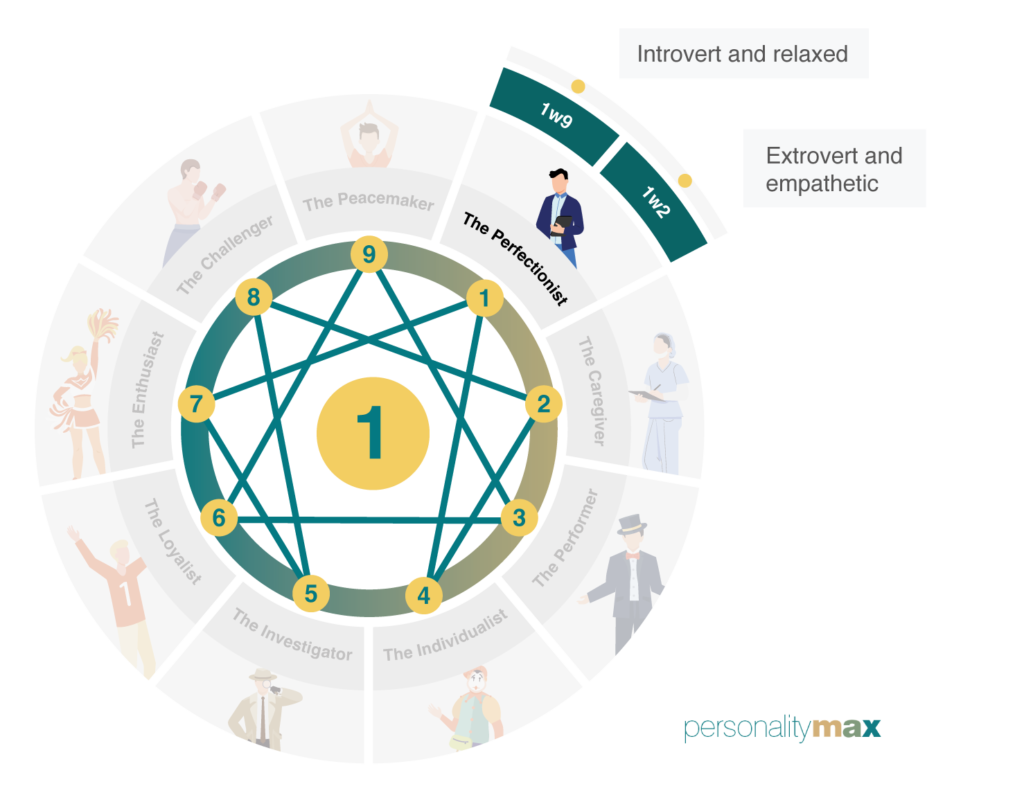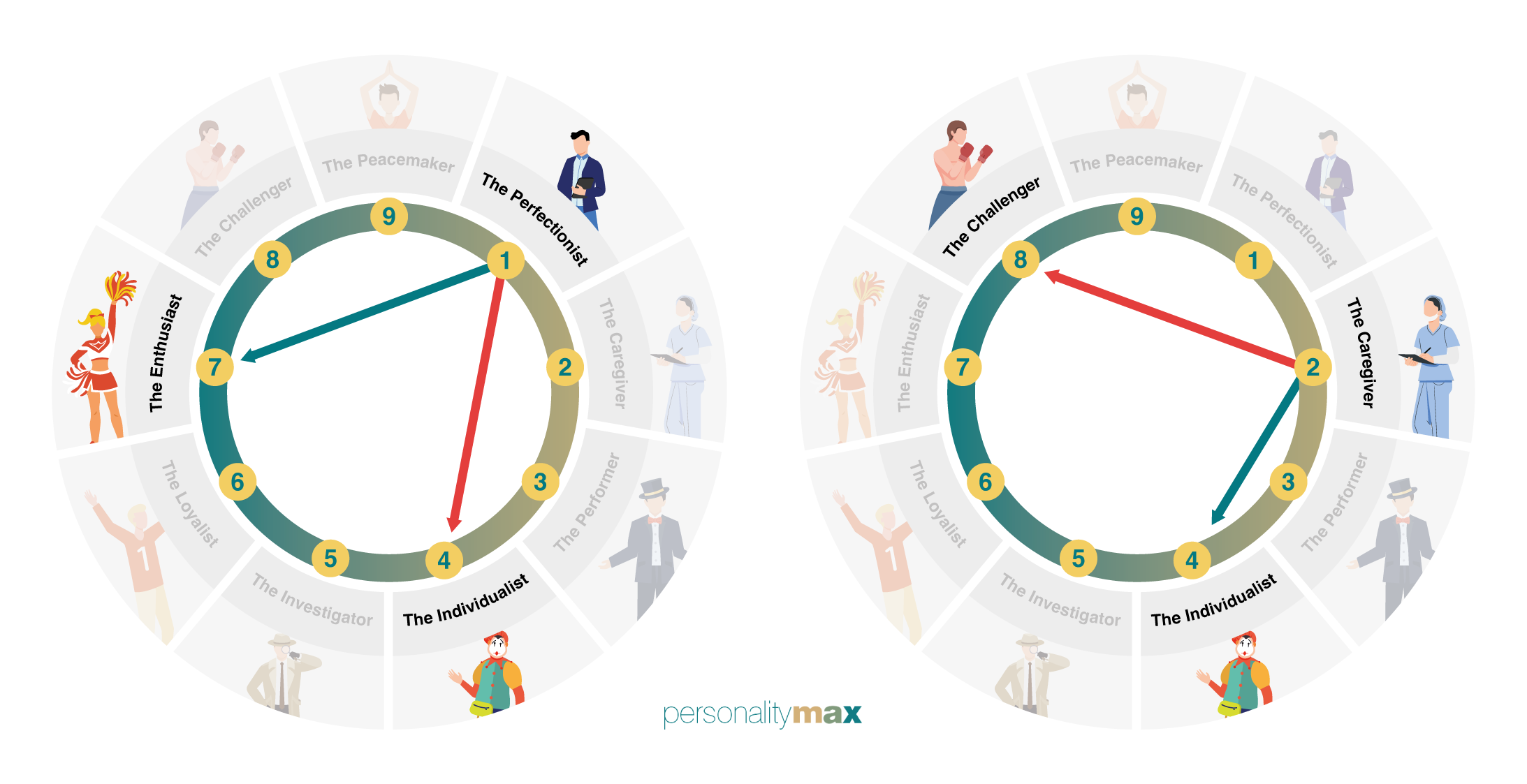The Enneagram test uses an algorithm to work out which one of the nine personality types you are. However, it’s really important to remember that humans cannot be completely explained by a type. Various factors influence our personalities and traits. In this article, we’ll explore how the wing of your core type can influence you.
If you put the nine Enneagram types in a circle, the 2 types beside your main type are your wings. A person’s primary characteristics make up their personality type. However, the wings can be considered supplementary characteristics.
Type 1s typically exhibit a hint of characteristics from 1 of their 2 neighboring wing points, allowing us to classify them as either 1 with a 9 wing or 1 with a 2 wing. In this article, we will explore Enneagram 1 with wing 2.

Key Characteristics
Below are some of the notable characteristics of a 1w2.
Personality Traits
- Strong desire to love and comfort everyone around them.
- Willing to debate their ideas.
- Expressive of their own views regardless of what people might think.
- Real action takers, unconcerned about whether things go according to plan.
- Follow their moral compass, no matter how challenging that may be.
- Try to look neat, clean, and put together—carry themselves with pride.
Motivations
The Enneagram test is different from other personality tests—it really delves into each type’s personality traits and looks at what influences them. It also looks at each type’s motivations, including what fears and desires they typically have.
Fears and desires go hand in hand, for example, someone’s fear of being perceived as weak is strongly linked to their desire to be seen as strong.
Fears
People often combat their fears with coping mechanisms, and the Enneagram believes that these coping mechanisms are ultimately how certain personality traits are manifested.
- For 1w2s, the thing they fear most is being perceived as unhelpful.
Desires
Each personality type reflected by the Enneagram has their own list of fears and desires and these are always connected to each other.
- For 1w2s, the thing they desire most is to make a difference in the world by helping others.
Strengths
- Compassionate and accepting of others.
- Prioritize their own needs before catering to the needs of others.
- Aware of their own limitations.
- Grounded and realistic with their expectations.
- Constantly improving themselves.
Weaknesses
- Prone to feeling hurt if their efforts are not appreciated.
- Try to control others without them being aware of it.
- Biased about their values.
- May feel victimized or taken advantage of, even if they sacrifice their own needs.
- May shift to wanting to improve people and situations to feel worthwhile and accepted.
Directions of Growth and Stress
The Enneagram recognizes that personalities are not fixed throughout our entire lives, they change over time and with situations that we face throughout our lives.
The nine types of personalities that the Enneagram references, show these changes in two different ways—direction of growth and direction of stress.

Growth Arrow to Seven and Four
1w2s, similar to their core type, head toward Enneagram 7 during growth. However, there will be some differences in the nuances due to the presence of the 2 wing, so they are likely to take on traits of Enneagram 4s.
The positive traits of Sevens (One Integration) may be present in 1w2 Enneagram types during times of personal growth. They:
- Would have a strong connection to their emotions and will experience them instead of repressing them—even when unwanted.
- Might, through their charming nature, be able to inspire others.
- Could use their newfound energy and vigor to multitask and accomplish worthwhile goals.
- Would probably feel more positive and energetic in their engagement with others.
- May enjoy organizing fun events and parties.
- Could become more adventurous.
Also, during growth, they could take on aspects of Fours (Two Integration) and are likely to:
- Have remarkable capacity for problem-solving to assist others.
- Become softer and more sympathetic without giving too much to others because they know their limits.
- Seek and provide warmth and affection to others.
- Become more passionate and conscious of their personal and environmental aesthetic beauty.
- Find creative methods of solving problems.
Stress Arrow to Four and Eight
Like their core type, 1w2s go to Enneagram 4 when they are stressed. But some of the specifics will be different because of the presence of the 2 wing. This means they could lean toward the less favorable traits of Enneagram 8.
The less attractive behavioral patterns of Fours (One Disintegration) may be present in 1w2 Enneagram types during stressful periods. They may:
- Feel unloved and unappreciated because they feel that their efforts are not reciprocated by others.
- Openly and shamelessly make themselves martyrs until the other person has no choice but to take a break from their relationship.
- Lean toward depression or defeatism.
- Have a fictionalized expectation of romance and love.
- Feel envious of how they perceive others to be.
Also, in stress, they may show aspects of Eights (Two Disintegration) and therefore:
- Be self-righteous and refuse to seek help from others because they think they know what’s best.
- Will be furious with having to strive for perfection and become enraged when they witness others who aren’t in control of their emotions.
- Erupt into quickly-diffusible bouts of anger.
- Become aggressive and perhaps even abusive.
- Get irritated and sarcastic when they’re required to wait for others.
Healthy vs. Unhealthy Enneagram 1w2s
Although we can discuss specific personality types when using the Enneagram test, one person does not stay in the same frame of mind all of the time. People change from day to day and even hour to hour, therefore, it is important to recognize the signs of someone behaving in a healthy or unhealthy range.
Signs of a Healthy 1w2
- Relaxed and can let go of their morally superior judgments.
- Can admit that what they think might not always be entirely true.
- Their corrections of others become less harsh and more helpful rather than annoying.
- They will have learned the difference between being proud of being perfect and being able to accept differences.
Signs of an Average 1w2
- Feel bad for breaking the ethical rules they set for themselves.
- Be outspoken about their opinions and display rage when others don’t act in accordance with their recommendations.
- Strive for perfection, have a strong sense of right and wrong, and take pride in themselves when they act morally.
- Educate others, even if their advice is unsolicited.
Signs of an Unhealthy 1w2
- Infuriated by the pressure to perform flawlessly and by the sight of those around them who lack emotional control.
- Repressed anger may come out in physical rigidity and implosive energy.
- Become hostile and withdraw from others.
- Want to punish themselves by wallowing in misery rather than feeling any kind of pleasure.
Growth Recommendations
- Be more tolerant of others, even though you may not agree with them. Not everyone has the same experiences and beliefs as you. Keep an open mind when dealing with other people so you can get in touch with your 2-wing more.
- Practice humility. You tend to be self-entitled, but you should know that the very faults you see in others may also be something you possess.
- Seek feedback from others. Be more open to what others constructively have to say about you. As someone concerned about improving yourself and achieving perfection, you can learn from other people’s valuable experiences and perspectives and use them to your advantage to be more compassionate and understanding.
- Explore your emotions more and try self-soothing techniques. Due to the presence of covert aggression in your subtype, you tend to repress any negative emotions you are experiencing. As a result, you may resort to compulsive habits or nervous breakdowns. Self-soothing techniques, like positive self-talk and breathing meditation, can help you tremendously.
Famous Enneagram Type 1w2s
The following famous people are Type 1w2:
- Elizabeth Warren—United States senator
- Daenerys Targaryen—Fictional character
- Vladimir Lenin—Russian revolutionary
- Emma Watson—English actress and activist
- Morgan Freeman—American actor and director
Enneagram 1w2 vs 1w9
Below, we’ll compare and contrast types 1w2 and 1w9.
Key Similarities
- Prioritize fairness and equality as they work to improve society.
- Idealistic and resist being swayed by others’ opinions.
- Have a code of conduct that they never deviate from.
- Harsh critics of themselves and others.
Key Differences
- 1w9s are introverted, and 1w2s are people-oriented.
- 1w9s tend to be calmer and more collected due to the influence of the 9 wing, the Peacemaker.
- 1w9s are far more rational.
- 1w9s care less about what other people think of them.
- The focus of 1w9s is on personal perfection.
- The focus of 1w2s is on serving others and making a perfect society.
- 1w9s would rather schedule time alone and work on themselves.
- 1w2s are more in touch with how they feel and are more likely to feel all of their emotions.
- 1w9s will actively seek to avoid unpleasant feelings and situations because they have a deep-seated distaste for them.
- 1w9s are more cautious—due to the 9 wing, they avoid taking risks.
- 1w2s are more likely to get themselves into dangerous situations, especially if somebody needs their help.
- 1w9s are more observant.
- 1w2s take a proactive approach and get their hands dirty to help others.
- 1w9s come across as passive bystanders rather than proactive doers—they oppose the aggressive ways used by 1w2s and would rather protest or advocate for justice in a more secure and nonviolent manner.
Conclusion
1w2s are consistently friendly and concerned about the well-being of others. They also have a kind demeanor and convey warmth to the people around them, making them likable.
They combine their concern for others with their desire to see the world improve. However, since they are so accustomed to being correct, they may have difficulty being open to ideas that question the values they hold dear. This may make it difficult for them to contribute positively to society.
When others do not take their advice, they quickly feel hatred and animosity toward those individuals. It would be to their advantage to cultivate humility, maintain a grounded perspective, and be aware that they do not own all of the solutions to life’s problems.
